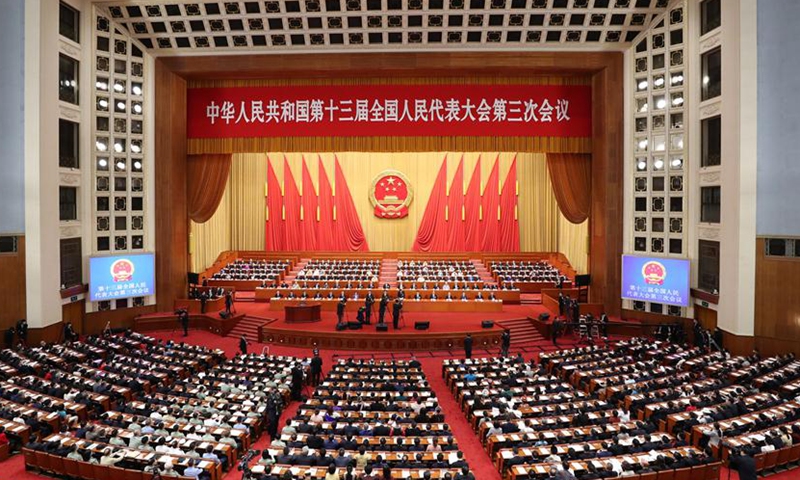Top legislature adopts Civil Code
Protection of private rights in China 'puts people first'

Photo: Xinhua
If someone steals my virtual goods in a video game, can I get them back? Can my unborn baby inherit property? Can I sue someone for using my voice for deep faking?Now, you can get the answers to all these questions simply by opening the encyclopedia of your life, China's first Civil Code, which has been adopted by the nation's top legislature.
Chinese lawmakers on Thursday voted to adopt the long-expected Civil Code at the third session of the 13th National People's Congress (NPC). The Civil Code will take effect on January 1, 2021.
China's first law with "code" in its name, the Civil Code is a wide-ranging legislative package that aims to provide legal protection of private rights including property, contracts, personality, inheritance, marriage and family. The Civil Code, which puts people's interests at the center and responds to major public concerns, takes China's legal system in terms of private rights protection to a new level, and it reflects the Communist Party of China's governing philosophy of "putting people first," analysts said.
During the third session of the 13th NPC, which concluded on Thursday, NPC deputies made some 100 changes to the draft Civil Code that was first unveiled in December 2019.
Those changes include expanding the definition of sexual assault to include using texts and images to assault others, not only just speeches and actions.
The 1,260-article draft has seven parts: general provisions, property, contracts, personality rights, marriage and family, inheritance and tort liability.
The highlight of the world's latest modern-day civil law is that personality rights have become an independent part of the law. This indicates that China's new law has made up for the defects of the traditional Continental law system, which puts more emphasis on property than people.
The Civil Code responds to all kinds of challenges of protecting one's personality rights in the internet era, analysts said.
The personality rights part describes in detail the rights of reputation, name, image and privacy. Rights of voice, name and property in the virtual world are mentioned for the first time in any Civil Code in the world, which fully reflects the "internet feature" of the law as it keeps pace with the times, Zhu Wei, a professor at the China University of Political Science and Law in Beijing, told the Global Times on Thursday.
Zhu said that the personality rights section will become the chief basis for the protection of online personality rights.

Local residents read reports about a draft civil code being deliberated at the two sessions in front of an outdoor newspaper display board in a park in Beijing on Tuesday. Photo: cnsphoto
On Thursday, several Civil Code-related topics trended on China's social media. Among them, the topic of a cooling-off period for divorce attracted more than 800 million views on Sina Weibo.
The law introduces a cooling-off period for couples who apply for a divorce amid soaring divorce rates in recent years. Zhu said this provision does not mean that China isn't protecting people's freedom to marry; instead, it shows that the law has the function of correcting improper social customs.
As for wide public concerns that the cooling-off period should not apply in cases involving domestic violence, the Legislative Affairs Commission of the NPC Standing Committee explained that it only applies to couples who apply for a divorce at the civil affairs department.
Divorces involving domestic violence are usually dealt with through lawsuits.
In its marriage section, which is based on China's Marriage Law, the code didn't mention the family planning policy in the draft that was released for public comment last year. However, the Marriage Law clearly stipulates that China implements a family planning policy. This omission has triggered speculation that China might further ease its family planning policy, allowing couples to have three or more children.
Huang Wenzheng, a demographics expert, told the Global Times on Thursday that since last year. the family planning policy has gradually faded into history, and the final version of the Civil Code is unlikely to include the policy.
"It means that China will end its family planning policy eventually, and that time may come after China finishes its seventh population census next year," Huang said.
During this year's two sessions, several legislators and political advisors proposed to further ease the family planning policy to allow couples to have a third child, considering the continuously dropping birth rate and mounting pressure of an aging society.
The decision to compile the Civil Code was announced in October 2014 at a plenary session of the Communist Party of China Central Committee. The legislative process started in June 2016.

